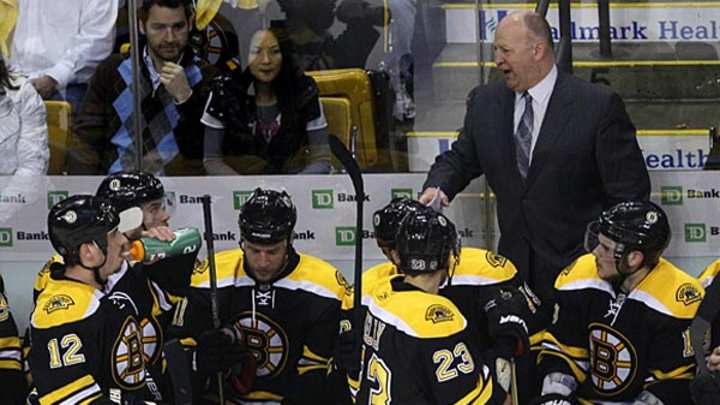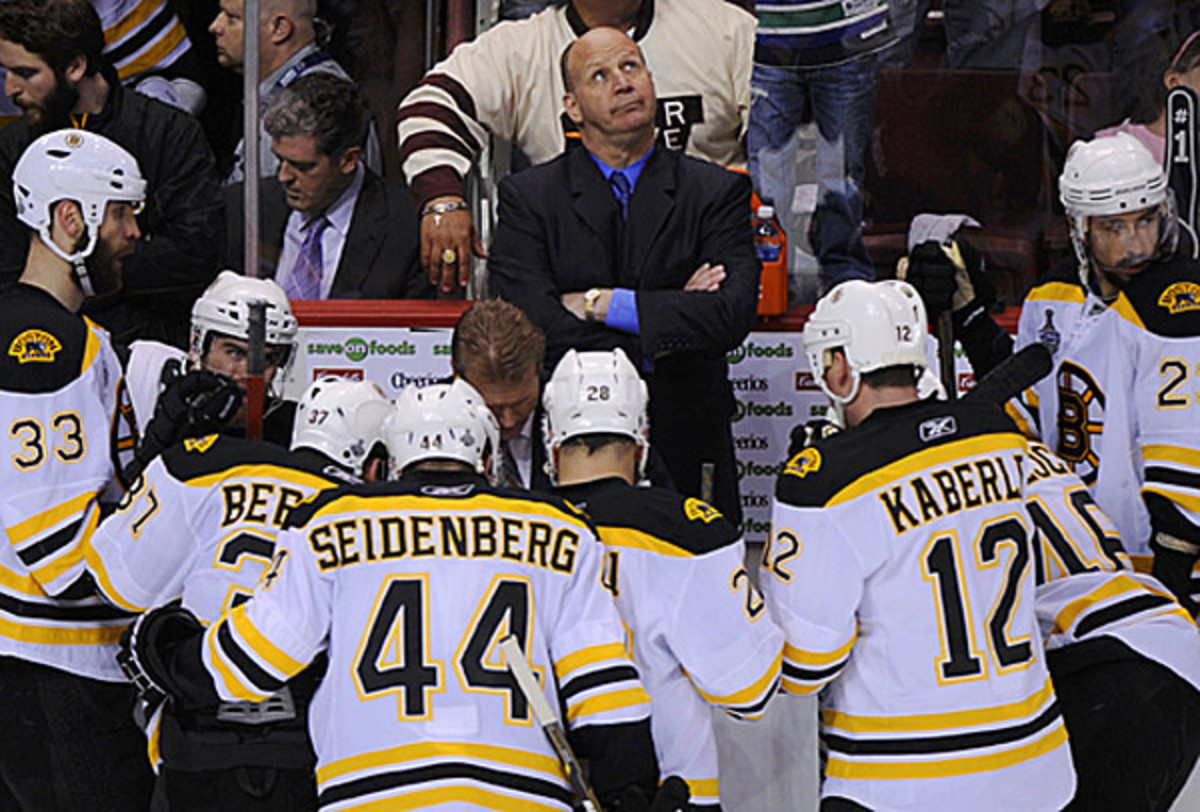Julien vindicated by Bruins' Stanley Cup

Coach Claude Julien took lots of heat as he patiently guided his team on its long, hard road to the title. (Andy Clark/Reuters)

By Stu Hackel
When the 2010-11 season was around a dozen weeks old, the Bruins went into a brief tailspin and some fans, bloggers and media types felt that coach Claude Julien was the wrong guy to run this team. Too defensive-oriented, they charged, Too predictable. Unwilling to shake up his team or mix up his lines...
Unfazed, Julien stuck with his plan and the Bruins finished atop the Northeast Division. When the playoffs began, the Boston media speculated that he'd have to win at least two rounds or he'd be gone, especially coming off the Bruins' historic playoff collapse against Philadelphia the previous spring after having led the series 3-0. And when the B's went down 2-0 to Montreal in the opening round, the gravediggers went reaching for their shovels.
This morning, Claude Julien is the coach of the Stanley Cup champions, something he greatly deserves. Which only goes to prove that what is said or written in the media and among fans has -- or should have -- little to zero impact upon what happens when the puck drops.
You often hear players and coaches in the playoffs talk about tuning out all outside distractions and focusing on their tasks. Julien had to do that all year. "As a coach you're going to be subject to criticism, but the most important thing is what's going on inside that dressing room," he remarked from the postgame podium (video) after Game 7 against Vancouver, his five-year-old daughter sitting next to him, a Stanley Cup Champions t-shirt in his hand. "There wasn't a guy that didn't believe in what we were doing. So it's easy to stay the course, and you got to stay the course. Today you're rewarded for it."
The reward came in the form of a 4-0 Bruins victory over the Presidents' Trophy-winning Canucks, a team that many favored to win the series, a talented team that Julien, his staff, the players and the Bruins; management figured out how to wear down and exploit, just as they'd done with their three previous foes in the earlier rounds. No team was more determined, more resilient and more opportunistic than Julien's Bruins. They followed his game plan and that's why they skated with the Cup on enemy ice on Wednesday night.
A championship team should be able to win big games in the other guy's barn. It hadn't happened in this final until last night. The Canucks had their chance to win it all on Monday in Boston. They failed and opened the door for the Bruins to break that pattern and do what the last four champions had done -- capture the Stanley Cup on the road.
The Bruins had won on the road all playoffs. They had to win two straight in Montreal in the first round, a place where they hadn't won all year, after losing the first two at home. It was Julien the players credited for not panicking and helping to guide them to a seven-game win. They won a pair in Philadelphia to open that series, starting a redeeming sweep. They won an important Game 3 in Tampa Bay to regain home ice advantage in that round, which they also won in seven. Even in the games of the final that they lost in Vancouver, they were in each one to the end, which is more than the Canucks could say for the games they lost in Boston. The B's never let the venue stop them.
They never let anything stop them. On Versus after the game, analyst Keith Jones called the B's victory a triumph of heart and will over talent. You can do that in hockey. It's a game in which a team with engaged passion can overcome a team with superior skill. We saw that will over skill last night in any number of instances, most tellingly on Patrice Bergeron's crushing third goal, a shorthanded tally, where he outraced a faster skater, Christian Ehrhoff...
...and made the lead 3-0 late in the second period. It was insurmountable and so crushed the Canucks' spirit that they never really seriously threatened to score again.
Julien knew at the outset what everyone who picked the Canucks to win knew: Vancouver had better players. His plan was to emphasize defense, his forte, and neutralize the Canucks' skill with physical play all over the ice, even after the whistles. Former NHL coach Mark Crawford, serving as an analyst on the NHL Network said on Wednesday night, the Bruins "made it a street fight" and by doing so, they wore down Vancouver. It was a fight in which the Canucks, hardly a team of Lady Byng Trophy-winners, were eager to take on and help initiate -- and one they ultimately lost.
Consequently, the talk of this series differed greatly from most Stanley Cup finals, in which fans and the media revel in the best hockey of the year. Instead, it became about biting, taunting, slashing, cheap shots, late shots, high sticking, slewfooting, diving, embellishing, brawling, trash talking and name calling. The street fight character moved the focus away from the more skilled players on each team and on to each club's antagonists, guys who thrive and even create that environment. Prior to Game 7, TSN's Bob McKenzie called it "Revenge of the Twerps," noting that the two best players for each team through the first six games were super-pests Brad Marchand and Maxim Lapierre. The Sedins were never a major factor, nor were David Krejci or (until Game 7) Bergeron.
The stories in the Vancouver media today are beginning to tell of some of the Canucks' physical injuries, some administered by the Bruins, some not, but the B's stayed relatively healthy, quite remarkable considering their physical style of play and the fact that they went through three seven-game series. Their only major injury during the playoffs was Nathan Horton's concussion, the result of Aaron Rome's late hit. The league assessed an unprecedented four-game suspension on Rome, further destabilizing Vancouver's defense corps that was already reeling from the Game 1 loss of Dan Hamhuis to injury from administering a hip check to Milan Lucic...
....(and note the post-whistle dust-up). Those two absences -- both self-inflicted -- helped shift the balance between these clubs. By comparison, Julien easily moved Rich Peverley into Horton's first line spot and the B's experienced little, if any, drop-off.
A curious dynamic took place. The Canucks were supposedly the faster team, but by the time Game 3 rolled around, their suddenly uncertain defense gave the Bruins too much room and Boston became faster. The Canucks were supposedly the deeper team, but their depth couldn't prevent defeat. The Canucks were supposedly the more skilled team, but players like Marchand, who emerged as the best among all the skaters in the series, began displaying skills few knew they possessed. Marchand is a player who opponents and opposition fans love to hate, and he has inherited the nickname, "the Rat," the one that belonged to Ken Linseman, the league's best agitator who played for the Flyers, Oilers, Bruins and Leafs from 1978 to 1992. But every team would love to have Marchand in their sweater. He created Bergeron's first goal last night with this excellent bit of skating...
...narrowly missed scoring himself shortly afterward on a similar play when he swooped in but hit the post, then later tallied the second goal with as much skill as will...
...before finishing the scoring with a late-game empty-netter (video). Marchand is an unusual ingredient in Julien's stew, a rookie who gets big minutes and has a big role. Along with some Bruins veterans, Julien frequently had to rein in the often-belligerent 23-year-old during the season and he spoke about that after Game 7. "Brad Marchand came up to me after Game 5," Julien related, "and he said to me, 'You know, I know you're always talking to me about some of the stuff going on,' but he says, 'I want you to know that I appreciate you trying to help me through that.' And it's almost like a parent trying to help their kids. And at the end, you know, it's called tough love, but you're doing it for the right reasons and I think our players understood that."
Julien also stuck by older players who struggled at times during the postseason, notably Mark Recchi, Michael Ryder and Tomas Kaberle, resisting calls to take them out of the lineup. In each case, his loyalty was rewarded with better and sometimes excellent performances. And while his reputation is one of inflexibility, Julien massaged his defense pairings in the first round, putting Zdeno Chara together with Dennis Seidenberg to create a very effective shutdown tandem. And he tinkered with his awful power play until the B's got it right. They won the special teams battle against the Canucks, who had the best in the league this season.
Most notably, Julien recognized that Tim Thomas had regained his form of two seasons ago, reinserted him in goal very early in the season and used him wisely, not overusing him, keeping him fresh for his Conn Smythe Trophy performance. Kevin Weekes on the NHL Network wondered if Thomas's rambling, gambling style might redefine the way the goaltender position is played. Thomas isn't the first of his kind. Dominik Hasek came before him. Gump Worsley came before Hasek. They have no definable system the way butterfly goalies do. They rely on angles and athleticism, they get in the head of the other team and don't give an inch. It made Thomas the perfect backstop for Julien's team.
"As a coach, you stand here and you're happy about what you gave people on the outside," Julien reflected, articulating something universal that Stanley Cup champions seem always to express about those around him and the meaning of what they've accomplished. "There is good proof here, my family, my wife and daughter and my parents that came in from Ottawa, my in-laws, and those people growing up had an impact on your life. You want to do it for those people. You want to do it for the players that have sacrificed, and their wives and girlfriends and for the fans in Boston.
"You're paid to do a job and the job is to succeed. And when you succeed, you've made everybody around you. your fans. and everybody else happy."
It's not about him. It's about everybody.
